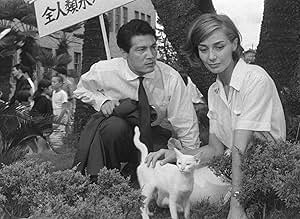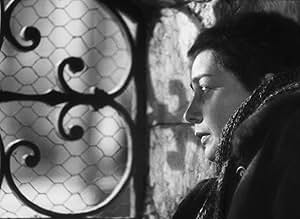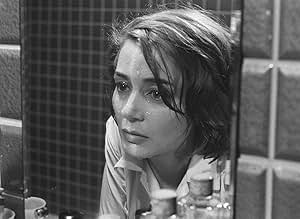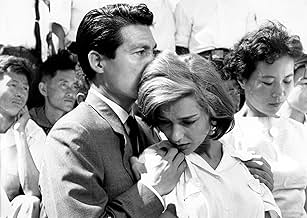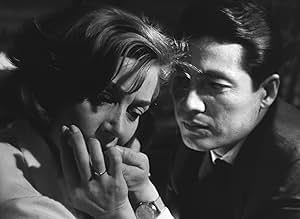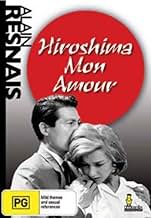CALIFICACIÓN DE IMDb
7.8/10
38 k
TU CALIFICACIÓN
Una actriz francesa en pleno rodaje de una película pacifista en Hiroshima tiene una aventura con un arquitecto japonés casado, con quien comparte diferencias respecto a la guerra.Una actriz francesa en pleno rodaje de una película pacifista en Hiroshima tiene una aventura con un arquitecto japonés casado, con quien comparte diferencias respecto a la guerra.Una actriz francesa en pleno rodaje de una película pacifista en Hiroshima tiene una aventura con un arquitecto japonés casado, con quien comparte diferencias respecto a la guerra.
- Nominado a 1 premio Óscar
- 7 premios ganados y 7 nominaciones en total
Opiniones destacadas
I saw this thirty or so years ago. I don't remember it moving me profoundly, but then so many things at that age routinely inject you with massive change without you knowing. Seeing it now gives me great, great appreciation for what it is. And though I have been previously exposed, it washed over me all over again.
It has a laconic pace. Usually, one leverages this for relaxation into nature. Robert Redord. Here it relaxes into a tension of a different order, a quiet insistent striving for connection, like "In the Mood for Love." In this case though, the filmmaker has turned that yearning sideways so you have three dimensions of pull.
You have the desire for romance, here presented in a way that is more engaging than usual because of its folding into the other dimensions. You have the desire to comprehend war, war defined here as the sacrifice of innocents and war as a sort of incomprehensible desire running in parallel to all the other incomprehensible desires we see, every one.
And you have the desire of a film to reach into the inner world of ourselves. Film itself is a character here, with its own desires and doubts. The three of these fold in such a way that as we spend time with them we have to fill it by pouring ourselves into the film because it pulls story from us rather than serving it in timely patter.
Its an open world, made open by providing an amazing skeleton, on which we are surprised to find our own flesh and our own wondering about next actions.
He, an architect, she an actress, both highly cinematic beings. Both in Hiroshima with folded cranes over dying souls in beds. Both, this is us now, wondering, shall we do it? Shall she stay? What will it mean? Surely that the world will not be saved, not even a little, not even that they may try. Or will they? Should they?
This is such an open framework that not only do you pour yourself into it, but other filmmakers can and do. You owe it to yourself to see "H Story." after this. Or better, before. Hah!
Ted's Evaluation -- 4 of 3: Every cineliterate person should experience this.
It has a laconic pace. Usually, one leverages this for relaxation into nature. Robert Redord. Here it relaxes into a tension of a different order, a quiet insistent striving for connection, like "In the Mood for Love." In this case though, the filmmaker has turned that yearning sideways so you have three dimensions of pull.
You have the desire for romance, here presented in a way that is more engaging than usual because of its folding into the other dimensions. You have the desire to comprehend war, war defined here as the sacrifice of innocents and war as a sort of incomprehensible desire running in parallel to all the other incomprehensible desires we see, every one.
And you have the desire of a film to reach into the inner world of ourselves. Film itself is a character here, with its own desires and doubts. The three of these fold in such a way that as we spend time with them we have to fill it by pouring ourselves into the film because it pulls story from us rather than serving it in timely patter.
Its an open world, made open by providing an amazing skeleton, on which we are surprised to find our own flesh and our own wondering about next actions.
He, an architect, she an actress, both highly cinematic beings. Both in Hiroshima with folded cranes over dying souls in beds. Both, this is us now, wondering, shall we do it? Shall she stay? What will it mean? Surely that the world will not be saved, not even a little, not even that they may try. Or will they? Should they?
This is such an open framework that not only do you pour yourself into it, but other filmmakers can and do. You owe it to yourself to see "H Story." after this. Or better, before. Hah!
Ted's Evaluation -- 4 of 3: Every cineliterate person should experience this.
The comparison between heart break and the Hiroshima bombing is beautiful. The film is about the pain of memories forgotten and remembered. Just as the pain of lost love will be forgotten so too have the horrors of Hiroshima. The scars will always be there but that feeling of pain and isolation as the world celebrates while you mourn will be lost in the past. Lui is helping to rebuild Hiroshima as an architect and Elle has fled Nevers, the place of her love affair with a German soldier. The film represents Frech New Wave in it's reaction against the Hollywood style. The plot is reminiscent of Brief Encounter and Casablanca (they even go to a bar called Casablanca at one point) but the films style is vastly different. Action will jump in time while conversation remains the same, the story jumps around chronologically and we are often unsure of where precisely in time we are. The reason it sets itself apart from other new ave films is it's use of style. Jump cuts and screwing with the chronology are not used because they can be but for a purpose. The chronology is off because the scenes are memories acting like real memories and flowing randomly. The cuts help accentuate how little time these two lovers have with each other before they will be parted. An excellent film well-deserved of it's excellent reputation.
It's nearly impossible to talk about "Hiroshima, Mon Amour" in the same language I use to talk about other films. Even people used to international cinema may find themselves somewhat boggled by this visual tone poem. It's beautiful, and it leaves a distinct impression, but it does so in the way that a striking and unexpected image would, not in the way that an accessible film narrative would. Therefore, it interests without ever fully engaging.
To say that Resnais' film has something in common with silent cinema would be misleading, because sound certainly matters. But the movie definitely feels like a piece of non-verbal cinema, where sensation matters more than cognition.
A movie I probably need to see again to truly appreciate.
Grade: A
To say that Resnais' film has something in common with silent cinema would be misleading, because sound certainly matters. But the movie definitely feels like a piece of non-verbal cinema, where sensation matters more than cognition.
A movie I probably need to see again to truly appreciate.
Grade: A
This is surely one of the most impressive movies i know. It is also a very impressive portrait of a woman. Don't expect to see an ordinary love story -it is as not so much a love story as a story of a wounded person meeting a wounded city. A story about two people hurt by peace. Even though it is over more than four decennia old it feels surprisingly new. The reason for this must be the beautiful photography -starting with the very first shots of the two lovers- and the deliberate moving away from conventional script writing by Marguerite Dumas. The movie has the feel of an opera, with the music of Georges Delerue as a moving force. I thought it was enchanting, and it stayed with me for days after.
10RunPepe
This film has been compared to "Citizen Kane," not because of the story itself, but the way it is told, and through innovative artistic devices. The screenplay is highly poetic even when describing destruction, death, and madness. Several jump cuts in time occur with voice-over, and, at the beginning, voice-over during a montage of frightening images from the aftermath of the Hiroshima bombing and the bodies of the two lovers in bed. The characters represent different cities; the Japanese man, Hiroshima, the French woman, a city in France, Nevers (was this intentional?), but the latter might as well represent any outside nation. While "Hiroshima," even after being destroyed by an "ally" of France, falls in love with her and wants her to stay, despite his claims that she can never know what the bombing was really like, yet leaving this in the past without forgetting, "France" is hung up on a dead Nazi soldier whom she had loved, and became an outcast because of it. What the soldier really seems to represent is not the Nazis, but rather a real, true love that transcended nationalities and associations. France's past is personal and fears forgetting it, while Hiroshima's is communal and, while not wanting to forget, also wants to move ahead. For this reason Hiroshima keeps trying to convince France to stay so that they can be in love, but France is too preoccupied with its own personal ghost that it cannot share, which is why it is a major breakthrough for her when she tells her tragic story for the first time to anyone, Hiroshima. Hiroshima's past tragedy being communal is shared and it wants to share with the rest of the world. France's tragedy is personal and is only beginning to be shared. It takes the entire film before the two characters can get to a beginning of something more than their differences and likenesses of tragedy and loss in the past, and this beginning is who they really are, in the present, two people reborn from these tragedies.
¿Sabías que…?
- TriviaThis film pioneered the use of jump cutting to and from a flashback, and of very brief flashbacks to suggest obtrusive memories.
- ErroresWhen Elle leaves the hotel to go the set, she is wearing a nurse's uniform with a headscarf and carrying a black handbag. When Lui meets her on the set, she is now wearing a skirt and blouse and still has the headscarf. When they leave the set, the headscarf is left behind. When they get to Lui's house, she now has a white jacket.
- ConexionesEdited into Histoire(s) du cinéma: Le contrôle de l'univers (1999)
Selecciones populares
Inicia sesión para calificar y agrega a la lista de videos para obtener recomendaciones personalizadas
- How long is Hiroshima Mon Amour?Con tecnología de Alexa
Detalles
- Fecha de lanzamiento
- Países de origen
- Idiomas
- También se conoce como
- Hiroshima Mon Amour
- Locaciones de filmación
- Nevers, Nièvre, Francia(street scenes, river banks)
- Productoras
- Ver más créditos de la compañía en IMDbPro
Taquilla
- Total en EE. UU. y Canadá
- USD 96,439
- Fin de semana de estreno en EE. UU. y Canadá
- USD 18,494
- 19 oct 2014
- Total a nivel mundial
- USD 139,947
- Tiempo de ejecución1 hora 30 minutos
- Color
- Mezcla de sonido
- Relación de aspecto
- 1.37 : 1
Contribuir a esta página
Sugiere una edición o agrega el contenido que falta



